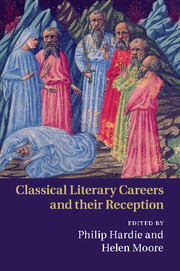Book contents
- Frontmatter
- Contents
- List of contributors
- Preface
- Note on the text
- Introduction: Literary careers – Classical models and their receptions
- 1 Some Virgilian unities
- 2 There and back again: Horace's poetic career
- 3 The Ovidian career model: Ovid, Gallus, Apuleius, Boccaccio
- 4 An elegist's career: from Cynthia to Cornelia
- 5 Persona and satiric career in Juvenal
- 6 The indistinct literary careers of Cicero and Pliny the Younger
- 7 Re-inventing Virgil's Wheel: the poet and his work from Dante to Petrarch
- 8 Did Shakespeare have a literary career?
- 9 New spins on old rotas: Virgil, Ovid, Milton
- 10 Bookburning and the poetic deathbed: the legacy of Virgil
- 11 Literary afterlives: metempsychosis from Ennius to Jorge Luis Borges
- 12 ‘Mirrored doubles’: Andrew Marvell, the remaking of poetry and the poet's career
- 13 Dryden and the complete career
- 14 Goethe's elegiac sabbatical
- 15 Wordsworth's career prospects: ‘peculiar language’ and public epigraphs
- Epilogue: Inventing a life – a personal view of literary careers
- List of works cited
- Index
Epilogue: Inventing a life – a personal view of literary careers
Published online by Cambridge University Press: 10 November 2010
- Frontmatter
- Contents
- List of contributors
- Preface
- Note on the text
- Introduction: Literary careers – Classical models and their receptions
- 1 Some Virgilian unities
- 2 There and back again: Horace's poetic career
- 3 The Ovidian career model: Ovid, Gallus, Apuleius, Boccaccio
- 4 An elegist's career: from Cynthia to Cornelia
- 5 Persona and satiric career in Juvenal
- 6 The indistinct literary careers of Cicero and Pliny the Younger
- 7 Re-inventing Virgil's Wheel: the poet and his work from Dante to Petrarch
- 8 Did Shakespeare have a literary career?
- 9 New spins on old rotas: Virgil, Ovid, Milton
- 10 Bookburning and the poetic deathbed: the legacy of Virgil
- 11 Literary afterlives: metempsychosis from Ennius to Jorge Luis Borges
- 12 ‘Mirrored doubles’: Andrew Marvell, the remaking of poetry and the poet's career
- 13 Dryden and the complete career
- 14 Goethe's elegiac sabbatical
- 15 Wordsworth's career prospects: ‘peculiar language’ and public epigraphs
- Epilogue: Inventing a life – a personal view of literary careers
- List of works cited
- Index
Summary
There is an old story about an analytic philosopher who became exasperated with the shocking neglect of history in his field. He decided to give a lecture on the Meaning of Truth, and prefaced it by saying that, this time, he would go back to the very origins of the problem. Then the lecture proper began: ‘In 1910 Bertrand Russell …’
A part of me finds that story quite sympathetic. Reflecting on the scholarly field of literary careers, I might follow the same route back to the very origins of the problem. The study of poetic careers began one January day in 1981, in Santa Barbara, California, when I gave a talk that drew on my forthcoming book The Life of the Poet, and that evening took part in an informal seminar where Richard Helgerson described his work in progress on laureate poets. Together we made history that day – though no one then seemed to notice. Eventually our ranks would swell and others would join the conversation, until a whole new discourse was born. Or so goes my story, which seems as plausible as most that scholars tell about their own importance.
But even in a personal view, that history might be just a bit self-serving. Perhaps one ought to go back a little – say three millennia or so. Instead of starting in Santa Barbara, then, the story would begin on the mountain of Helicon.
- Type
- Chapter
- Information
- Classical Literary Careers and their Reception , pp. 287 - 299Publisher: Cambridge University PressPrint publication year: 2010



